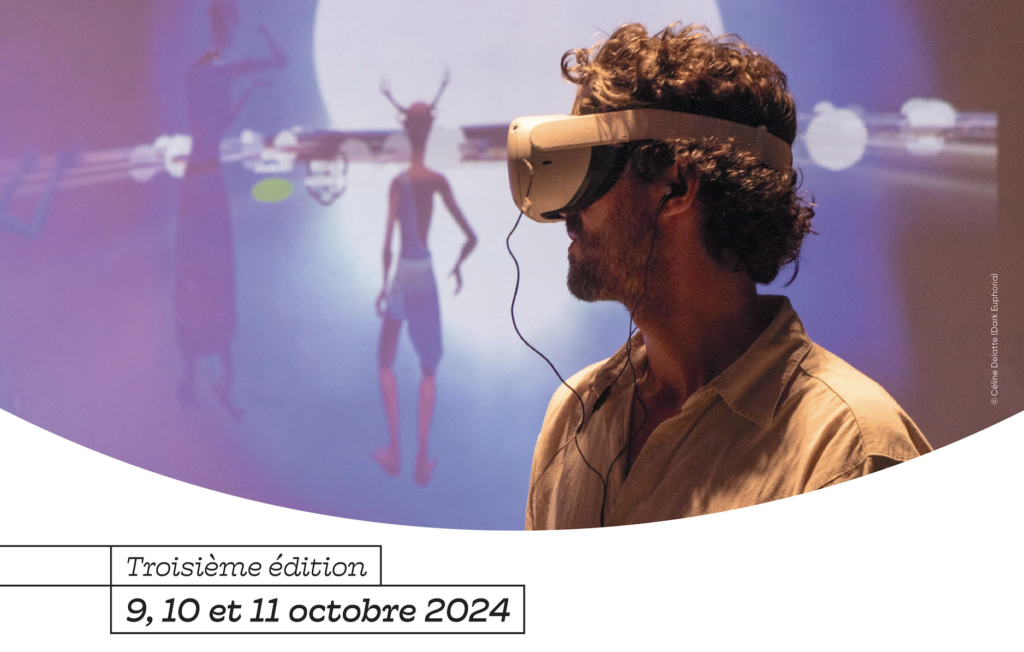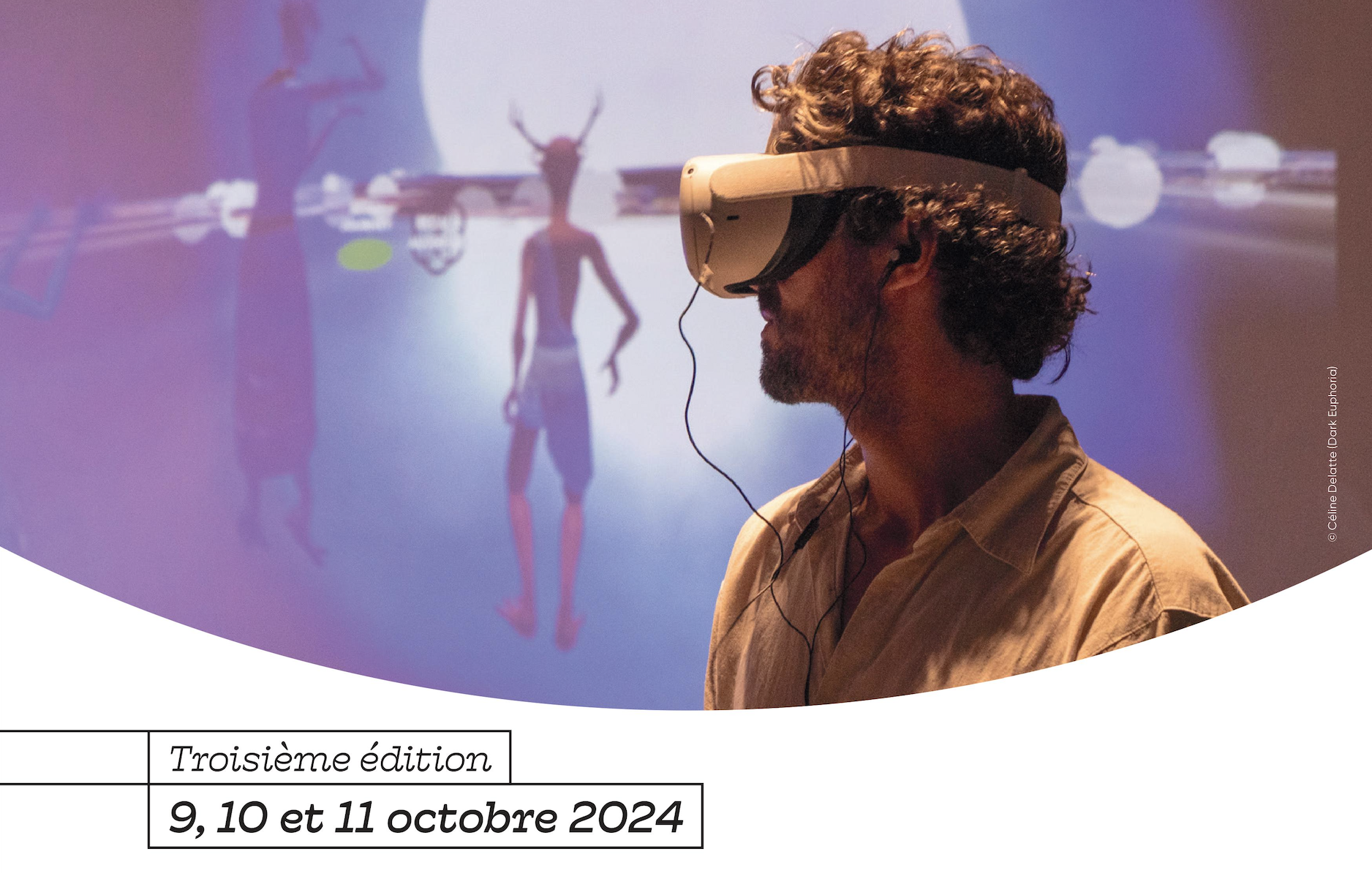
Inscription/registration avant le 8 octobre 2024 ici :
8h30 – Mots d’ouverture / Conference opening
SALLE 2E07
Johnny Douvinet (directeur recherche Institut CPSN)
Vincent Labatut (co-directeur FR Agorantic)
Graham Ranger (directeur ICTT)
Guillaume Marrel (directeur Institut CPSN)
Avec l’équipe d’organisation :
Rémi Ronfard, INRIA Univ. Grenoble Alpes
Corinne Touati, INRIA Univ. Grenoble Alpes
Cyrielle Garson, ICTT, Avignon Université
David Galli, CNE, Avignon Université
Sam Cornu, ICTT, Avignon Université

SALLE 2E07 9h00 – 10h30
Chair/Pres. Paola RANZINI (ICTT, Avignon Université)
Session 1 : Informatique théâtrale et réalité immersive 1 / Computer Theater and Immersive Reality 1
Claire Paillon (SAT) “La téléprésence Scenic, un nouveau médium artistique pour connecter les scènes et les publics” / « Scenic Telepresence, a New Artistic Medium to Connect Stages and Audiences »
Axel Belin (ENSAD) “L’art théâtral dans le miroir numérique: l’incarnation en réalité virtuelle par la mise en jeu et la répétition théâtrale” / « Theater Arts in the Digital Mirror: the Incarnation in Virtual Reality through Staging and Theatrical Rehearsal »
Julien Dubuc (Invivo) “La fin du présent d’Invivo. Tentative de coéxistence de différentes réalités au plateau via les technologies ?” / « Invivo’s End of Present. An Attempt to Make Different Realities Coexist on Stage through Technologies? »
10h30 – 11h00
SALLE 2E07 11h00 – 12h30
Chair/Pres. Georges GAGNERÉ (Paris 8)
Session 2 : Informatique théâtrale et réalité immersive 2 / Computer Theater and Immersive Reality 2
- Cyrielle Garson (Avignon Université) et Rémi Ronfard (Inria) “Le métavers, un nouvel espace vide pour le théâtre ?” / « The Metaverse, a New Empty Space for Theater? »
- Ronan Gaugne (Université de Rennes) et Valérie Gouranton (INSA Rennes) “XR et Arts numériques, un retour fructueux de l’interdisciplinarité” / « XR and Digital Arts, a Successful Return of Interdisciplinarity »
- Vivianna Chiotini (CNSAD-PSL) et Rémi Sagot-Duvauroux (EnsAD) “Rythme(s) d’espaces 2 et 3 : variations sur l’usage de la réalité virtuelle pour la mise en scène” / « Rhythm(s) of Spaces 2 and 3: Variations on the Use of Virtual Reality for Staging »
12h30 – 14h00
SALLE AT01 14h00 – 15h30
Session 3 : Théâtre et métavers / Theater and Metaverse
- David Gochfeld (Royal Central School of Drama, visio) et Roman Miletitch (artiste indépendant) “Designing Tools for Live Performance in Social VR” / Créer des outils pour le spectacle vivant au sein des réseaux sociaux de réalité virtuelle
Federica Patti (Università degli studi di Torino, visio) “The Digital Performance between User Experience Design and the Metaverse” / Le spectacle vivant numérique entre la conception de l’expérience utilisateur et la Métavers
Topher Maraffi (North Carolina State University, visio) “Macbeth Metahuman: Performing Craig’s Uber-Marionette in Hyper-Reality”/ Macbeth Métahumain: interpréter l’Über-Marionnette de Craig en Hyper-Réalité
15h30 – 16h00
SALLE AT01 16h00 – 17h30
KEYNOTE #1 : Brendan Bradley (visio)
The Next Act : Evaluating Tools and Envisioning the Future of VR Theater/ Le prochain acte : évaluer différents outils pour envisager le futur du théâtre en réalité virtuelle
Chair: Cyrielle Garson (Avignon Université)
17h30 – Fin de la première journée / End of day one

SALLE 2E07 8h30 – 10h30
Chair/Pres. Julie Valéro (Université Grenoble Alpes)
Session 4 : Interaction et immersion / Interaction and Immersion
Jean-François Jego (Paris 8), Sophie Daste (Paris 8) et Rémy Sohier (Paris 8) “Émergences performatives d’œuvres interactives créées en contexte de jam” / « Performative Emergences of Interactive Works Created in (a) Jam Context »
Stéphanie Le-Briz (Université Côte d’Azur) et Hui-Yin Wu (Université Côte d’Azur) “Theatron VR AI: Bringing Non-initiated Audiences (Back) to the Theater, Perspectives on VR and Improvisation” / « Theatron VR AI: faire revenir au théâtre les publics non-initiés, perspectives sur la réalité virtuelle et l’improvisation »
Jean-François Trubert (Université Côte d’Azur), Maxence Mercier (Université Côte d’Azur), Camille Giuglaris (Université Côte d’Azur) “Scènes et Expérience immersive : vers une dramaturgie visuelle et sonore de l’émergence” / « Scenes and Immersive Experience: Toward a Visual and Sound Dramaturgy of Emergence »
Cécile Chantraine Braillon (La Rochelle Université, visio) “E-spectateur, informatiser l’analyse du spectacle vivant” / « E-spectator, Computerizing Live Performance Analysis »
10h30 – 11h00
SALLE 2E07 11h00 – 12h30
Chair/Pres. Jean-François Jego (Paris 8)
Session 5 : Intelligence artificielle et texte dramatique / AI and Playwriting
Arthur Amalvy (Avignon Université), Nicolas Diassinous (Avignon Université) et Vincent Labatut (Avignon Université)“Dynamique des relations dans Lorenzaccio : modélisation par réseaux complexes” / « Relationship Dynamics in Lorenzaccio: Modeling by Complex Networks »
Pierre Jourlin (Avignon Université) “Intelligence artificielle générative pour la création théâtrale : une mission impossible ?” / « Generative Artificial Intelligence for Theatrical Creation: An Impossible Mission? »
Dominic Chamayou-Douglas (University of Kent et Université de Lille) “Playwriting Obsolescence: Why Write Plays in an AI-enabled society?” / « L’obsolescence de l’écriture dramatique : pourquoi écrire encore des pièces à l’ère de l’IA »
12h30 – 14h00
SALLE 2E07 14h00 – 15h30
Chair/Pres. Franck Bauchard
Session 6 : Intelligence artificielle et arts de la scène / AI and Performance
Ester Fuoco (Université IULM) “Chorégraphies numériques : quand la danse rencontre l’Intelligence Artificielle” / « Digital Choreographies: When Dance Meets Artificial Intelligence »
Yannick Estève (Avignon Université), Patrick Seminor (acteur indépendant et Jarod Duret (Avignon Université) “De l’intelligence artificielle au théâtre ?” / « Artificial Intelligence in Theater? »
Luca Befera (Università degli studi di Torino) “Scenic Ecologies: AI Theatre Applications for Hybrid Ecosystems and Communal Interplays” / « Écologies scéniques : applications de l’IA au théâtre pour des écosystèmes hybrides et des interactions communautaires »
15h30 – 16h00
SALLE 2E07 16h00 – 16h30
Qu’est-ce que l’informatique théâtrale ? (Rémi Ronfard, INRIA) “What is computer theater?”
SALLE 2E07 16h30 – 17h30
KEYNOTE #2 : Qui a hacké Garoutzia ? Quand des informaticiens écrivent pour le théâtre. « Who Did Hack Garoutzia ? When Computer Scientists Write for the Theater »
Table Ronde avec Laurence Devillers (Sorbonne Université),
Lisa Bretzner (comédienne et auteure) et Serge Abiteboul (Inria)
Animé par Rémi Ronfard (Inria)
17h30 – Fin de la deuxième journée / End of day two

SALLE 2E07 8h30 – 9h00
Présentation de la filière théâtre du PEPR ICCARE avec Rémi Ronfard (Inria), Florence March (Université Paul Valéry) et Jean Varela (Directeur du Printemps des Comédiens)
Presentation of the PEPR ICCARE Theater Sector with Rémi Ronfard (Inria), Florence March (Paul Valéry University) and Jean Varela (Director of the Printemps des Comédiens)
SALLE 2E07 9h00 – 10h50
Chair/Pres. Mireille Losco (ENSATT)
Session 7 : Séquenceurs et logiciels de régie / Sequencers and Stage Management Softwares
Victor Inisan (UPJV et Paris 8) “Enjeux esthétiques, techniques et logistiques des moteurs de jeu vidéo pour la conception lumière en spectacle vivant” / « Aesthetic, Technical and Logistical Issues of Video Game Engines for Live Show Light Design »
Julien Blais (Université Laval) “Expérimentations et intégration de la réalité mixte dans le théâtre contemporain : une approche créative et interdisciplinaire en quête d’innovation.” / « Experimentation and Integration of Mixed Reality in Contemporary Theater: A Creative and Interdisciplinary Approach in Search of Innovation »
François Weber (ENSATT) “Outil de spatialisation sonore pour le spectacle vivant. AXOA / ADM_OSC, évolution et retour d’expérience” / « Sound Spatialization Tool for Live Performance. AXOA / ADM_OSC, Evolution and Feedback »
Nicolas Bertrand (Millumin/Anomes) et Philippe Chaurand (Millimin/Anomes) “Pourquoi votre logiciel ressemble à ça ?” / « Why Does Your Software Look Like This? »
10h50 – 11h20
SALLE 2E07 11h20 – 12h50
Chair/Pres. François Weber
Session 8 : Captures et capteurs / Captures and Sensors
Michael Lew (Lev studio) “Capturer le mouvement pour les arts vivants : une comparaison de différentes approches” / « Capturing Movement for the Performing Arts: a Comparison of Different Approaches »
Lea Dedola (Lyon 2) “L’Interfaçage des Émotions dans le Spectacle de Cirque Contemporain. (Sous-titre) Retour d’expérience sur les premières phases de création de l’œuvre VIBH2O : le logiciel VIBE e-MOTION.” / « The Interfacing of Emotions in the Contemporary Circus Show (Feedback on the first Stages of Creating the VIBH2O Work: the VIBE e-MOTION Software) »
Anastasiia Ternova (Paris 8), Georges Gagneré (Paris 8) “Le dispositif de capture de mouvement comme contrainte et outil de création dans un contexte de performance” / « The motion Capture Device as a Constraint and Creative Tool in a Performance Context »
12h50 – 14h00
SALLE 2E07 14h00 – 15h30
Chair/Pres. Léa Dédola (Lyon 2)
Session 9 : Entre la scène et l’écran/ Between the Stage and the Screen
Hélène Jacques (Collège Lionel-Groulx) et Olivier Lapointe (Université du Québec à Montréal, visio) “Capteur de scènes, un outil numérique d’analyse des captations théâtrales et des tapuscrits de spectacles” / « Scene Sensor, a Digital Tool for Analyzing Theatrical Footage and Playtexts »
Sandrine Siméon (Soka University of America) “Repenser le théâtre à l’ère du numérique : les enjeux et les innovations de la performance filmique avec Nobody de Cyril Teste” / « Rethinking Theater in the Digital Age: The Challenges and Innovations of Film Performance with Cyril Teste’s Nobody »
Virginie Privas-Breauté (Université de Lorraine) “Vivre le théâtre immersif virtuel en 1ère personne ou en 3ème personne : la question du point de vue, son impact sur l’expérience phénoménologique et ses enjeux didactiques” / « Experiencing Virtual Immersive Theater as 1st person or 3rd person: the Matter of Perspective, its Impact on the Phenomenological Experience and its Didactic Issues
15h30 – 16h00
SALLE 2E07 16h30 – 17h30
Quel avenir pour l’informatique théâtrale ?
Animé par Rémi Ronfard (Inria) et Cyrielle Garson (Avignon Université)
What future for Computer Theater?
Chaired by Rémi Ronfard (Inria) and Cyrielle Garson (Avignon University),
17h30 – Fin de la dernière journée / End of the final day
L’événement a lieu en salles 2E07 et AT01, Bâtiment Nord, Campus Hannah Arendt d’Avignon University : 74 Rue Louis Pasteur, 84029 Avignon
